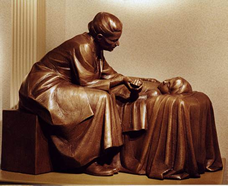Becoming a physician requires more than the academic mastery of information and technical skills. As physicians, we have to develop our selves. We need to become the kind of person who is a real doctor and healer, capable of acting compassionately, of placing the welfare of our patients above all other considerations, and of caring for those who are medically and socially vulnerable. We need to be the kind of person who can wrestle honestly with all the psychological, social and financial pressures of medical education and practice and continue to stay close to core values.
Download a summary of our program. |
|
| |
Dr. Wagner David K. Wagner, MD, FACEP, FAAEM told this story at his
2015 induction into the Gold Humanism Honor Society. He is Professor of
Emergency Medicine at Drexel University College of Medicine and Senior
Director of the American Board of Emergency Medicine. He trained as a
general and pediatric surgeon, and became a founding director and past
president of the American Board of Emergency Medicine. |
 |
This "becoming" is called professional formation, the process of forming as an individual who can serve the calling of medicine. "The processes of formation include experience and reflection, service, growth in knowledge of self and of the field, and constant attention to the inner life as well as the life of action. 'Who am I becoming as I move towards this life of service?' is a critical question in formation, as disciplinary acculturation and expertise increases." (Inui T. A Flag in the Wind: Educating for Professionalism in Medicine. 2003. p27.)
The Professional Formation Curriculum is delivered throughout all four years of medical school. It includes a series of special sessions and core components of many required courses. The purpose of the curriculum is not only to educate students about the principles and obligations of professionalism, but also to support them as individuals who are developing themselves into compassionate healers and humanistic scientists. |
"Doctor and Child" by T.J. Dixon and James Nelson. Located on the Queen Lane Medical
Campus. |
| |
"I knew a doctor once who was honest, but gentle with his honesty, and was loving, but careful with his love; who was disciplined without being rigid, and right without the stain of arrogance; who was self-questioning without self-doubt, introspective and reflective, and in the same moment, decisive; who was strong, hard, adamant; but all these things laced with tenderness and understanding, a doctor who worshipped his calling without worshipping himself, who was busy beyond belief, but who had time – time to smile, to chat, to touch the shoulder and take the hand, and who had time enough for Death as well as Life.
Now, there was a professional." |
| |
From: On professionalism.
In Bedside Medical Stories
by Michael A Lacombe |
|
Contact Information
Steven Rosenzweig, M.D.
Director of Professionalism Curriculum
SR454@drexel.edu
215-991-8530
|
